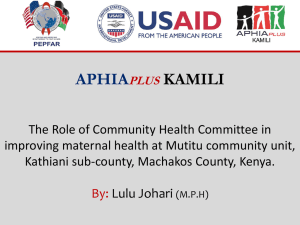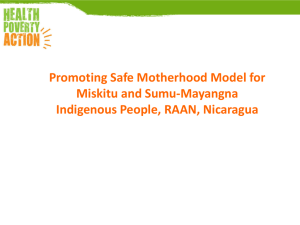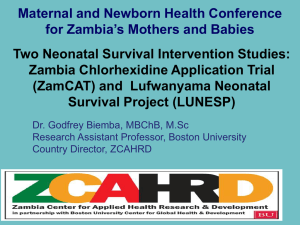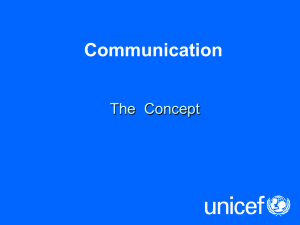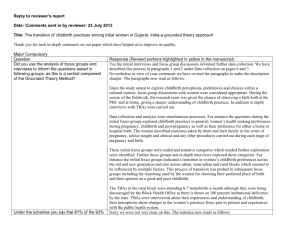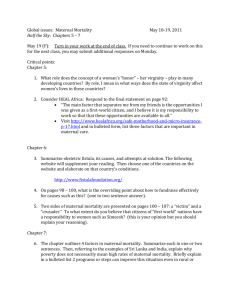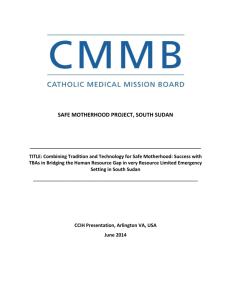Traditional knowledge and Public health. Experience from Mali:
advertisement
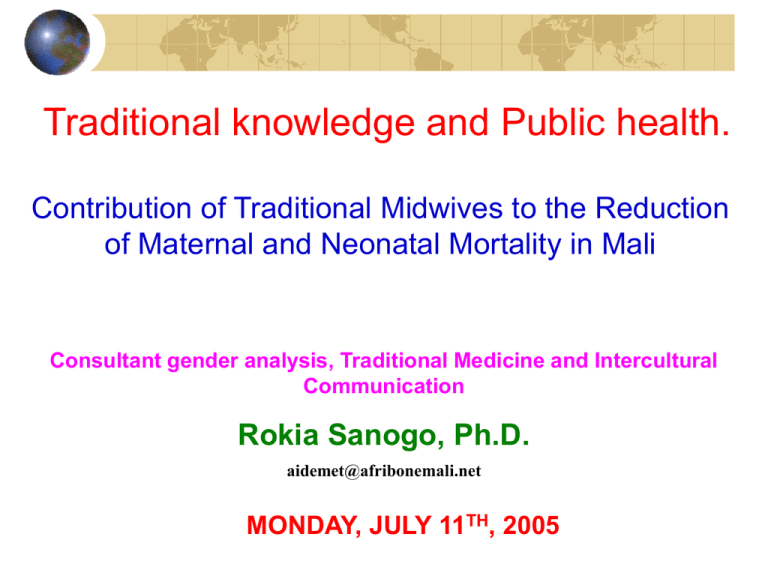
Traditional knowledge and Public health. Contribution of Traditional Midwives to the Reduction of Maternal and Neonatal Mortality in Mali Consultant gender analysis, Traditional Medicine and Intercultural Communication Rokia Sanogo, Ph.D. aidemet@afribonemali.net MONDAY, JULY 11TH, 2005 MALI AFRICA Mali Overwiew Introduction Context and justification Goals Traditional medicine against HIV/AIDS Activities Workshops of the Traditional Midwives Methodology Results to Kolokani Conclusion Acknowledgments Introduction Data available from EDS III, 2001 • Maternal mortality 582/100.000 births A maternal death every 3 hours! • Newborn mortality 55 /1000 80 every day! • Infant mortality 113/1000 The retraining of TBAs From the 1980s, many attempts at “retraining” TBAs and the matrons were supported by WHO, UNICEF, UNDPA and other bilateral and multilateral cooperation agencies. The results obtained from these various programmes fell short of expectations for many reasons, including the following: The retraining of TBAs • The real “representativeness” of the TBAs without taking account some criteria (age, traditional authorities, etc.); • The retraining methodology, not taking account experiences and traditional knowledge; • The performance of the modern health facilities, a women in distress refereed could not always find a satisfactory solutions; • The absence of an efficient and accessible transportation system; and • The high cost of the surgical operation. Context and justification During the last ten years, all over Mali, efforts have been made to set up a system of management of obstetrical emergencies; within this framework, Referral Health centres (CSRef) and Community Health Centres (CSCom) were strengthened through the allocation of adequate human and technical resources: • Surgical team • Operating theatre suite (operative block) • Ambulance, • RAC telecommunication network. • Cost sharing for evacuation and surgical operations charges. Context and justification System of management of obstetrical emergencies was organized in Kolokani sanitary district in 1997; In spite of this new context, the access to this system still remains very short of expectations. Context and justification Context was characterized by following features: • Weak rate of utilisation in the CSComs of mother, child care services and delivery (not only to related to economic and accessibility obstacles, but also cultural and traditional obstacles); • Non covered elevated. obstetric need rates remained • Number foreseen of women to risk didn't arrive at the level of the CSCOm. Problems One of problems detected was the communication between villages of the CSCom. Solutions? To find the solution, we use traditional system of childbirth management existent in each village The protagonists of this system are TBAs, who: • had been practicing this function long before the creation of health centres; and, • enjoy the respect and trust of the village community. objectives The main objectives were “information and organisation of TBAs for their contribution in the management of the obstetrical emergencies” by valorising their traditional role, experiences and knowledge in pregnancies and delivery assistance. Expectations On the basis of these observations it was considered possible and useful to develop a collaboration between the traditional system of childbirth and modern system of management of obstetrical emergencies.. Goals The main goals of this collaboration were: • to detect critical cases and to refer in time, very quickly; • to valorise the role of TBAs in delivery assisted in the villages; • to involve the TBAs, by valorising their knowledge and know-how to break the cultural and communication barriers between the women in distress and the CSCom. and, • to allow more equitable and access to the obstetrical emergencies management system. Methodology and Approaches Training “information and organisation of TBAs for their contribution in the management of the obstetrical emergencies” were carried out in this new context with new methodology and approaches: The training was not a classical type, during which the trainers to transmit elements of knowledge and knowhow to the participants. Methodology and Approaches Rather, it was to facilitate intercultural dynamic exchanges during which the experiences, competencies and even certainties of the all parties are studied and valorised, but also if necessary, put in discussion. Methodology and Approaches Methodology that can be recommended was • open-mindedness, • mutual respect, • courage of every one to put himself into question, • willingness of all to listen and learn, • recognition by all of their own limits: • frank and equal discussion. Methodology and Approaches The analysis of critical and concrete cases and the identification of positive and efficient behaviors and to find realistic solutions to dramatic problems. Experiment in the district of Kolokani First activities were supported by NGO Terra Nuova /University of Turin - Italy. 1999 - 2000: Massantola, Sebecoro I, Ouolodo and Nonsombougou Health intervention area (CSCOm). World Bank contribution 1.Traditional Birth Attendances and reduction of mother and neonatal mortality 2002: Participation to conference “Local knowledge and development”(Bamako); 2003: Evaluation of impact of experience carried out in Kolokani from 1999 to 2000; and publication of Article on IK; 2004: Extension of experiences of TBAs to other CSCom of of Kolokani 2005: Participation to Pro-Cultura conference (Washington). World Bank contribution 2. Collaboration TM and MM against HIV/AIDS 2003: to help integrate IK into the Multi Country AIDS Program (MAP) in Guinea Conakry. 2004 to date: Mediation to help integrate TM into the MAP in Mali. Traditional medicine against HIV/AIDS From 2002 to date we have many TM actors informed against the HIV/AIDS 629 TM actors participated to the different activities of which 440 women (92%). November 2004: The Malian Federation TM actors traditional is member of the High National Council against the AIDS presided by the President of the Republic (Decree n° 04/550P-RM of November 25, 2004). Activities 1. TBAs and reduction of mother and neonatal mortality 1.1. Workshops “information and organization” of the TBAs on the system of obstetrical emergencies. 1.2. Assisted self-evaluation workshop. 1.3. District Inter-community exchanges workshop at the level of the District. 1.4. Regional Workshop of inter-community exchanges. 1.5. National workshop of validation Workshops of information and organization of the TBAs Visual supports: Cases need reference evacuation (visual Supports with 13 pictures) Cases need reference and evacuation Cases need reference and evacuation Cases need reference and evacuation Cases need reference and evacuation Workshops of information and organization of the TBAs Hygienic childbirth concept has been summarized with the help of visual supports and convenient demonstrations. Hygienic childbirth Kit have been provided to the TBAs. Every AT formed had like first endowment 20 new blades), of soap pieces, of the thread in cotton and a tube of ointment tetracycline 1%. Hygienic childbirth concept Hygienic childbirth concept Hygienic childbirth concept Hygienic childbirth concept Hygienic childbirth concept Hygienic childbirth concept Kolokani 2004 Workshop TBAs Sebecoro I 2003: Assisted self-evaluation workshop Kolokani June 2003: District Inter-community exchanges workshop Kolokani 2003: District Inter-community exchanges workshop Kolokani 2003: District Inter-community exchanges workshop Kolokani June 2003 Inter-community exchanges workshop National workshop June 2004 Results Kolokani 1999 - 2000 Results of experience in Kolokani from 1999 to 2000 In the year which followed the TBAs information and organisation workshop compared to the previous year, In the four health intervention areas covered: Massantola, Sebecoro I, Ouolodo and Nonsombougou): the other health intervention areas non covered: Didiéni,Toussana and Sabougou in the same periods. Results Kolokani 1999 - 2000 Indicators Areas covered (%) Areas Non covered (%) Prenatal consultation 53,00 to 58,90 57,00 to 58,47 Assisted deliveries 40,40 to 54,65 51,8 to 47,70 64,85 to 110,40 125,93 to 185,67 References/ evacuations Results Kolokani 2003-2004 Periods of data collection go from one year before workshops (1999-2000) at three years after workshops (2001-2003): Four health intervention areas of health where activities have been achieved (covered areas): (Massantola, Sébécoro I, Ouolodo and Nonsombougou), and for the same periods data are collected in health intervention areas, (non covered): (Didiéni, Toussana and Sabougou). Results are following: Results Kolokani 2003 Indicators Areas covered (%) Areas Non covered (%) Prenatal consultation 55,86 to 97,99 58,85 to 88,52 Assisted deliveries 40,01 to 62,92 46,76 to 43,59 References/ evacuations 62,23 to 102,42 106,94 to 100 Polio 0 vaccination 35,5 to 62,25 34,22 to 48,06 Results Workshops of information and organization of the TBAs 2004. Recommendation The objective is not to transform the TBAs in agents of modern health of first level, but to make play them role of the first link of the chain that begins in the village with the traditional system and continues with in the health intervention aerea of CSCom and the CSRéf with the modern system. Regional inter-community exchanges workshop 2004 The experience touched in the 8 health intervention areas about 300 TBAs. The non covered obstetric need passed from 81 percent in 1997 to 8 percent in 2003. National workshop validation 2004 Recommendations The following recommendations have been elaborated and adapted 1. The formal recognition of the role of the TBAs in the system of health in particular in the system of reference evacuation; 2. The capitalization of experiences through the country; 3. A national survey on the impact on activities of the TBAs; 4. The implication of the local authorities and the ASACO in the financing of advanced strategy activities Conclusion Activities led 2003 - 2004, twith the financial support of the World Bank, permitted : to uptake the activities on the valorisation of the role of the TBA in the obstetric emergencies management; to retake contact with different partners; to confirm to the TBAs importance in the system of obstetrical emergencies management; to appreciate the different actors adherence to activities of valorisation of the role of the TBAs in the reduction of the maternal and prenatal mortality; to identify the strong points and difficulties for the amelioration of the system of involvement of the TBAs. to note the adherence and the engagement of chiefs of families and the traditional authorities to activities of valorisation of the role of the TBAs Conclusion Recommendations of the national workshop give us of tracks for the future activities. Immediately it will be necessary to continue the advocacy for an optimal use of the TBAs in the maternal and neonatal health. We hope as well as the experience that we led to Kolokani for an useful implication of the TBAs will be taken henceforth in account in the context of a national strategy of reduction of the maternal neonatal and mortality in Mali, on occasion of the development and the take in the PRODESS and in the National Politic of traditional Medicine in Mali. A good news! For the reduction of the maternal and neonatal mortality, the advice of Ministers of June 23, 2005, adopted the exemption from payment of the Caesarean at the public health structures like as Hospitals and Reference Centres of Health (CSRéf.). Acknowledgments We thank all the people who wanted really enter with us into this experience, and particularly the TBAs, Staff of health intervention aereas (CSComs), the staff of socio - sanitary of district (CSRéf) of Kolokani, the ASACO, Mayors, the traditional healers and the traditional authorities. Thanks to the Program « indigenous knowledge » of the World Bank to have been permitted the assessment, the extension and the diffusion of this experience. Thanks to the Ministry of Health through the DNS for monitoring attentive to the advocacy in favour of the implication of the TBAs. Thanks to all technical and financial partners, to associations and NGO for their contribution. Our acknowledgments to the Dr Daouda Mallé for the availability and the useful advices all along the project and to Ms. Suzanne Essama, to have believed and pushed the valorisation of knowledge and TBAs ability for the reduction of the maternal and neonatal mortality. Acknowledgments World Bank for the opportunity give me to exchange my experience with others persons. Thank for your attention!
